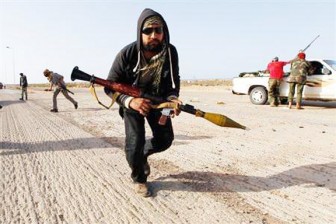NAWFALIYAH/MISRATA, Libya (Reuters) – Rebels advanced west toward the birthplace of Libyan leader Muammar Gaddafi yesterday, firing mortars and heavy machineguns in sporadic clashes with loyalist forces.

Emboldened by Western-led air strikes against Gaddafi’s troops, rebels took the town of Nawfaliyah and moved toward Sirte, Gaddafi’s home town and an important military base, in the sixth week of an uprising against his 41-year rule.
As rebels pressed forward in the east, Gaddafi’s troops were patrolling an area near the centre of Misrata after shelling the previously rebel-controlled western city for days and Arab news networks reported Western air strikes in the west of Tripoli.
The government in Tripoli said it had “liberated” Misrata from rebels and declared a ceasefire there.
Diplomatic activity accelerated on the eve of a 35-nation meeting in London today to discuss the crisis in the oil-producing North African desert state.
Italy proposed a deal including a ceasefire, exile for Gaddafi and dialogue between rebels and tribal leaders. The rebel leadership ruled out compromise with Gaddafi’s followers.
“We have had a vision from the very beginning and the main ingredient of this vision is the downfall of the Gaddafi regime,” spokesman Hafiz Ghoga told reporters in the rebel stronghold of Benghazi in eastern Libya.
Qatar became the first Arab country to recognize the rebels as the sole legitimate representative of the Libyan people, in a move that may presage similar moves from other Gulf states. Libyan state television called the move “blatant interference”.
Russia criticized the Western intervention that has turned the tide in the conflict, saying it amounted to taking sides in a civil war and breached the terms of a United Nations Security Council resolution.
US Vice Admiral Bill Gortney said yesterday the rebels fighting Gaddafi were not robust and the gains they have made on the battlefield in recent days were tenuous.
Gortney, director of the US military’s Joint Staff, said the United States was not directly supporting the opposition but it had achieved a military benefit from coalition air strikes.
He said the United States had no confirmed report of any civilian casualty caused by coalition forces and that coalition had fired six Tomahawk cruise missiles in the past 24 hours and had carried out 178 air sorties.
The French and British leaders called for supporters of Gaddafi to abandon him and asked Libyans opposing him to join a political process to pave the way for his departure. “Gaddafi must go immediately,” President Nicolas Sarkozy and Prime Minister David Cameron said in a joint statement. “We call on all his supporters to drop him before it is too late.”
In the nine days since the start of the Western-led bombing, the motley volunteer force of rebels has pressed half-way along the coast from its stronghold of Benghazi toward Tripoli and regained control of major oil terminals in the OPEC state.
A US Treasury Depart-ment official said rebels could sell Libyan crude without being subject to US sanctions if they conducted the transactions outside entities in Gaddafi’s administration subject to sanctions.
With its finances under pressure, the rebel leadership said it hopes to restart oil exports within a week. Some energy traders said that, sanctions aside, they could not touch Libyan oil because of shipping and legal risks.





